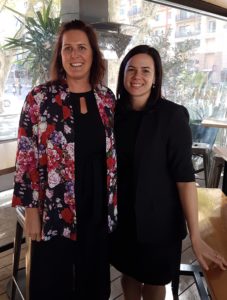Onshore versus Offshore – The Super User’s Perspective
Interviewee: Chloe Perkins, Mobilisation Coordinator, TRACE JV Broadspectrum
Interviewer: Stacey Magee, Service Delivery Coordinator, OPMS
Chloe is a Super User previously from Go Offshore. During her time with Go, she used OPMS for offshore mobilisations and was heavily involved in travel bookings, recruiting and allocating crew in various positions for their facilities with a heavy emphasis on training and compliance. She worked both on and offshore for projects during her time in her role.
Welcome back to Chloe, who is now working with Broadspectrum TRACE JV. Their main requirement for their project was for a Rostering tool, this has been implemented with them and we continue to expand on our capabilities in line with the company’s needs.
OPMS can be implemented as a complete package, incorporating all modules for a Client to be the one source of information, or, alternatively, Clients can choose to take on selected modules and add additional features in future when the need arises. Utilising the whole offering has obvious benefits to a company however, working alongside current systems is also possible with us.
Q: What are the biggest changes you have noticed within OPMS on your return to being a Super User?
The biggest difference is how OPMS is used at Broadspectrum. Having previously worked with OPMS for years in my other job, I felt a false sense of security when I took on my current role assuming I would automatically know how to do everything! Once I started however, I realised how differently it can be used from company to company and effectively had to start from scratch in some areas. Visually, it has not changed much so I can still navigate the system with ease.
The reports we generate are much more specific – this has been an essential part of the development since OPMS was implemented for the projects we are involved in. I have found the software more complex from a reporting perspective, due to the expansion and customisation of templates, combined with our increased requirements regarding available content. I have very much enjoyed using OPMS in a new way and discovering additional elements of the software.
Q: How much of your working day is made up by the time you spend working in OPMS? What are your main tasks now?
It depends on what phase of a project we are currently in. If we are prepping for a shut or starting a new project, there is a lot more work happening with creation of profiles, rostering, time sheeting etc. So, in total for me, maybe around 5-20% of the day in my role in terms of general Coordination. On the flip side of that, our more admin-based roles that are dealing with the site reporting and project compliance, are using OPMS for up to 80% of their day to day tasks.
Q: What are the main differences between how you were utilising OPMS in your previous role in comparison to how you are using it now?
I expected the rostering to be very similar to what I was doing previously with offshore however, have learned that with onshore there are a lot more variables in terms of worktypes and onsite time. Time sheeting is new to me also and we continue to work closely with the OPMS development team to automate these.
Q: What do you think the benefits are for companies using OPMS for onshore personnel management?
Having the capacity to make your reports more specific is fabulous. OPMS is always evolving with the companies that use their software, for me this is a huge benefit. A lot of the same reasons apply from offshore to onshore, the main one being the visual representation of where people are in the roster, their availability and as mentioned previously, compliance when this is used, especially across multiple sites. Being able to see all crew at all times is key for me.
Multiple users being able to access information is also highly beneficial. Utilising VPN access for our remote Users e.g. people based at site, is excellent. This also applies to out of hours work, not having to be physically at work or our desks to access relevant information at short notice is great. If we get calls on the weekend, we jump on the VPN and can resolve any issues or queries as they come up.
Thank you, Chloe, what a great catch up. Hearing about how you have worked with OPMS and our software over a large portion of your working life has been really interesting for me.
We always learn a lot in the interviews we conduct with our Users, we often better appreciate how people are utilising our system and highlight areas where we can educate our Clients that OPMS may already perform a function they are struggling with or doing in a more manual way.
Speaking with you today reminds me that OPMS is a flexible tool that can be used as seamlessly for onshore work as it can for offshore. This exposure helps us develop and fine-tune the way we approach all modules available to our Clients and, in particular with TRACE JV Broadspectrum, our reporting functions. We appreciate you taking time to chat with us.
